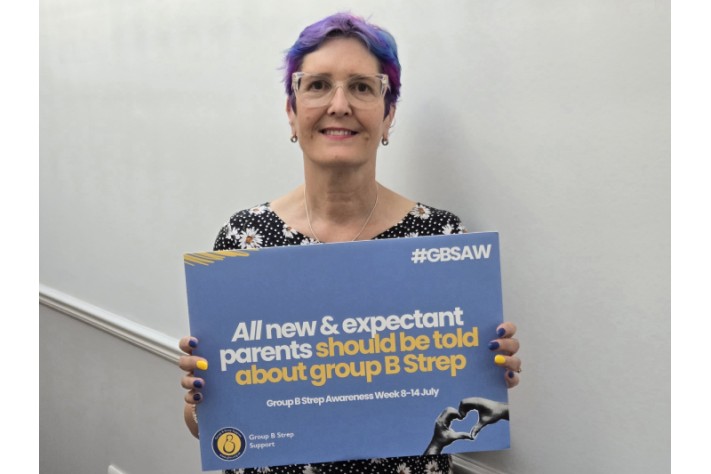11th July 2025
In support of Group B Strep Awareness Week (8–14 July 2025), we are delighted to share this Voices Blog by Jane Plumb MBE FRCOG FRSA, Chief Executive, Group B Strep Support. Jane shares some important messages to raise awareness of group B Strep infections and support health visitors in their practice.
Every day in the UK, two families receive the devastating news that their newborn has developed a group B Strep infection. Each week, one of these babies dies, and another survives with life-altering disabilities. These are not just numbers – they represent real families and real heartbreak.

Jane Plumb MBE FRCOG FRSA, Chief Executive, Group B Strep Support
A Personal Perspective
My husband and I founded Group B Strep Support after our son, Theo, died as a result of a group B Strep infection at just 17½ hours old. Our experience drives the charity’s mission to ensure no other family has to endure what we did.
Why Group B Strep Awareness Week Matters
Group B Strep Awareness Week (8–14 July 2025) is a focused campaign to raise awareness and encourage action. This year, we’ve moved from a month-long campaign to a dedicated week to help busy professionals and families engage more easily.
Our aim is simple: to ensure that every parent knows what group B Strep is, how it can affect their baby, and what steps they can take to protect them.
Understanding Group B Strep
Group B Strep is the most common cause of severe infection in newborn babies in the UK. It’s carried by around 20–25% of pregnant women and people, usually without symptoms. If passed to a baby during birth, it can cause sepsis, pneumonia, or meningitis. These infections are serious but usually preventable in newborn babies.
Supporting Families with Group B Strep Testing
If routine testing isn’t available through your local NHS trust, you can signpost families to the Group B Strep Support website for private testing options that follow national guidance.
Website to share: https://gbss.org.uk/info-support/group-b-strep-testing/
The site links to where individuals can purchase the recommended ECM (enriched culture medium) test. This test is usually done at home between 35 and 37 weeks of pregnancy, with results available in a few days.
How you might explain it:
“Our trust doesn’t currently offer routine testing for group B Strep carriage in pregnancy, but there are private options available. If you’d like to look into this, the Group B Strep Support website has details of reliable tests that follow national guidance.”
How you can support families as a Health Visitor
“Parents want to speak to someone who knows their stuff!” – ensure all health visitors are equipped with the knowledge and skills to support families during pregnancy and the postnatal period.
The Royal College of Obstetricians and Gynaecologists and NICE guidelines outline the importance of:
- Starting conversations about group B Strep.
- Explaining what it is and how it can affect newborn babies.
- Signposting families to reliable sources of information and testing options.
- Encouraging new and expectant parents to discuss group B Strep with their midwives or health teams.
What’s on the Horizon?
The GBS3 trial – the largest of its kind – is expected to report later this year. It will report on whether test-based approaches have been more effective than the current risk-based approach to preventing group B Strep infections in newborn babies. The findings could influence future NHS policy.
Resources to Support You
Download the free Awareness Toolkit, which includes:
- Posters for clinics and waiting areas
- Social media graphics
- Factsheets for parents
Download the toolkit at https://gbsaw.gbss.org.uk
How You Can Help
- Download and use the Awareness Toolkit in your daily practice
- Include group B Strep in your routine discussions with new and expectant parents
- Encourage new and expectant parents to ask about testing and prevention
- Share campaign materials on social media using #GBSAW (and do tag GBSS!)
Thank You
Thank you for your continued dedication. Your role is vital in protecting babies’ health and supporting families. I was delighted to record a podcast with Maddie Rew from the iHV to help raise awareness of GBSS. You can listen to the podcast here or on the link below. Together, we can raise awareness, empower parents, and help prevent the devastating impact of group B Strep infections.
Jane Plumb MBE FRCOG FRSA, Chief Executive, Group B Strep Support
Further resources and information on GBSS:
- Group B Strep Awareness Week (8 – 14 July) resources
- Leaflet co – written with RCOG for new and expectant parents – available in English and 14 additional languages
- Leaflet for families who have had a baby affected by GBS
- Summary of the RCOG’s Guideline on Group B Strep
- GBSS website
- Information about testing for GBS carriage
- Socials @groupbstrepsupport on facebook, Instagram and LinkedIn: ;@GBSSupport on twitter/X
- Free Helpline (for families and health professionals): 0330 120 0796 weekdays 9am – 5pm






